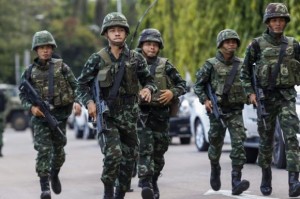
CREDIT: REUTERS/ATHIT PERAWONGMETHA
(Reuters) – The military takeover in Thailand drew swift international condemnation on Thursday, with the United States saying it was reviewing its military aid and other dealings with its closest ally in Southeast Asia.
Thailand’s army chief, General Prayuth Chan-ocha, seized control of the government two days after he declared martial law, saying the military had to restore order and push through reforms after six months of turmoil.
The military declared a curfew from 10 p.m. until 5 a.m., suspended the constitution and detained some politicians. Rival protest camps were ordered to disperse.
“There is no justification for this military coup,” U.S. Secretary of State John Kerry said in a blunt statement.
“This act will have negative implications for the U.S.-Thai relationship, especially for our relationship with the Thai military. We are reviewing our military and other assistance and engagements, consistent with U.S. law.”
European and Asian nations expressed concern over the coup, with Germany, France and Britain issuing statements of condemnation, Japan’s foreign minister calling it “regrettable” and Singapore urging all sides to avoid violence.
Kerry said he was concerned by reports that senior political leaders had been detained and called for their release. He urged the “immediate” restoration of civilian government and the lifting of curbs on the media.
U.N. Secretary-General Ban Ki-moon said he was “seriously concerned” and appealed “for a prompt return to constitutional, civilian, democratic rule and an all-inclusive dialogue that will pave the way for long-term peace and prosperity.”
Under U.S. law, with limited exceptions, no U.S. foreign aid may flow to “any country whose duly elected head of government is deposed by military coup d’etat or decree.”
JOINT EXERCISES IN QUESTION
The Pentagon said it was reviewing its military cooperation, including an ongoing joint exercise in Thailand involving some 700 U.S. Marines and sailors.
State Department spokeswoman Jen Psaki said that as much as about $10 million in annual bilateral aid could be cut.
For the fiscal year beginning October 1, the White House has asked Congress to give Thailand $5 million in development aid, $1.9 million for anti-drug and law enforcement programs, $2.1 million for military training and $900,000 for arms sales.
Only funds going to the government would be affected, not those for non-governmental groups and democracy promotion.
After the last Thai coup in 2006, Washington suspended about $24 million in aid, which included funds for military training and peacekeeping. It also cut off military sales.
The political unrest in Thailand is an unwanted headache for Washington at a time of rising tensions in the region due to territorial disputes involving an increasingly assertive China.
Singapore, Thailand’s partner in the 10-member Association of Southeast Asian Nations (ASEAN), called for all sides in Thailand to “avoid violence and bloodshed.”
“Thailand is an important regional country and a key member of ASEAN. Prolonged uncertainties will set back Thailand and the region as a whole,” a spokesman for its foreign ministry said.
Despite the strong words, outsiders’ ability to influence events could be limited given Thailand’s political polarization.
Ernie Bower of the Center for Strategic and International Studies think tank said the United States would have to impose sanctions, which would upset the Thai military. At the same time it was also likely to be criticized by the ousted Thai government and its supporters for not being tough enough.
While the amount of U.S. aid is not large, making sanctions largely symbolic, cutting support to the Thai military would also play into the hands of China, which has been wooing the Thais with officer training programs and other support.
“It matters, because China has been investing an incredible amount of energy in Thailand,” Bower said. “You could lose an alliance and if you don’t lose an alliance, you could in effect lose the primacy of a friendship with one of ASEAN’s anchor countries.”







